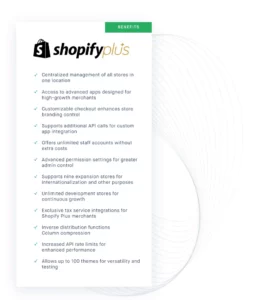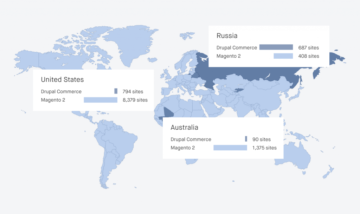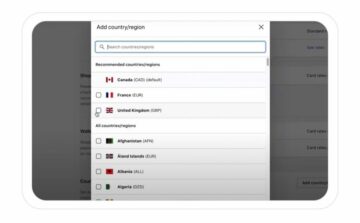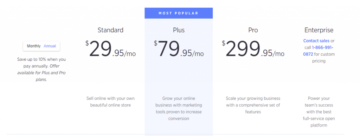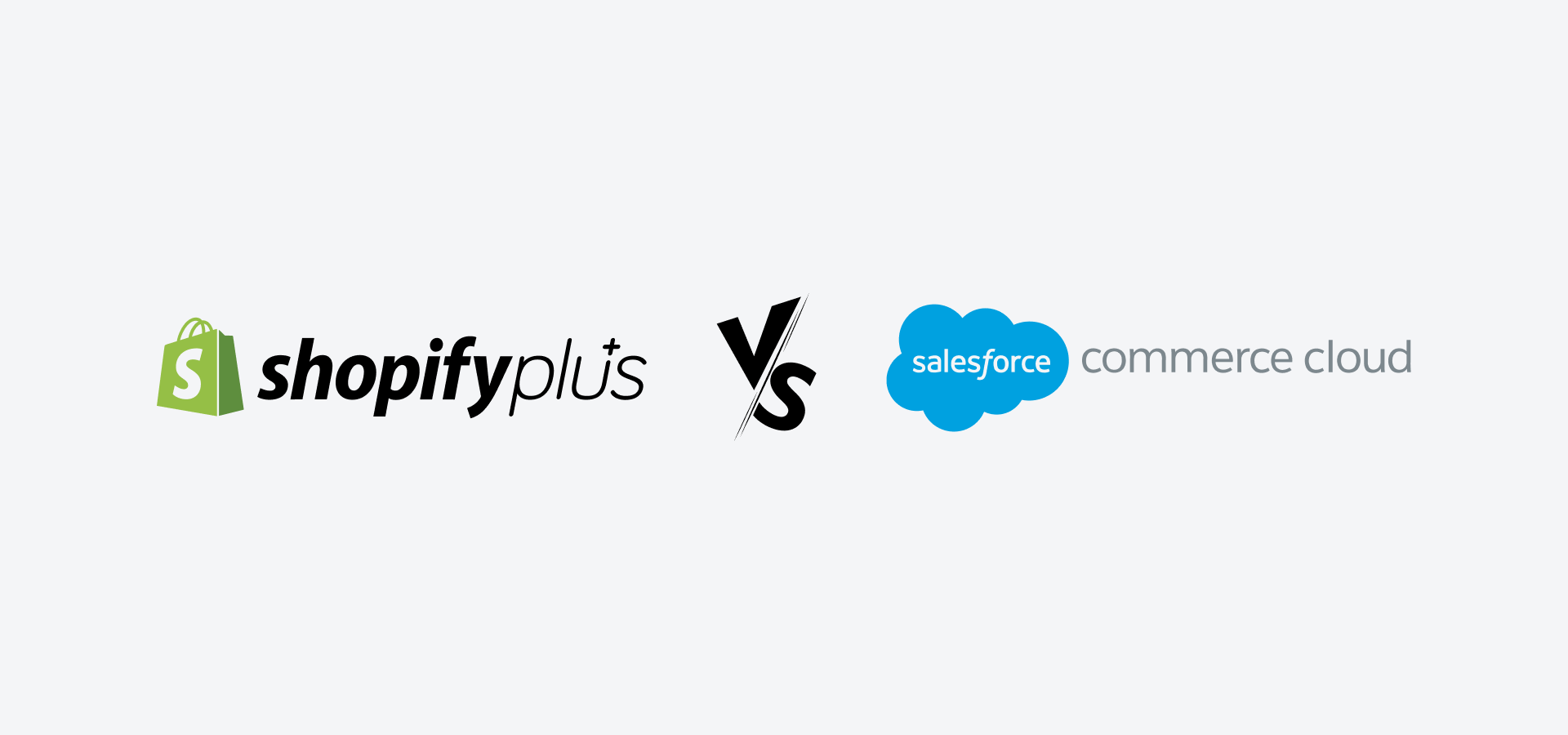
Shopify Plus vs Salesforce Commerce Cloud: A Head-to-Head Comparison
When you start your journey in the ecommerce realm, the selection of the software platform for building your online store is largely conditioned by two factors: price and simplicity of use. With the gradual growth of your professional skills and business appetite, low-cost and easy-to-handle platforms become a halter for your big-time ambitions. Entering the major league of the ecommerce industry requires embracing a more sophisticated instrument capable of boosting your sales and providing top-notch customer experience for the clientele.
The two most popular enterprise-size platforms are Salesforce Commerce Cloud and Shopify Plus.
Which one will be a better fit for your ecommerce organization? This article is called to assist you in making the right choice.
Shopify Plus vs. Salesforce Commerce Cloud: Approach Analysis
At first sight, both platforms have much in common since they are SaaS products, which means that their users enjoy all assets this type of software offers (scalability, flexibility, wide integration opportunities, regular upgrades, automatic updates, etc.). They provide excellent customer service and a quick learning curve, allowing for the creation of robust ecommerce sites with exquisite UI. Yet, when we dig deeper, we will see two different philosophies behind each brand.
Salesforce Commerce Cloud heavily emphasizes the wide range of native features that are susceptible to little customization. Shopify Plus is everything the other platform is not. By opting for Shopify Plus, you obtain only a very basic set of features but can enlarge this meager roster via leveraging numerous apps. Besides, customization that primarily involves the theme is extremely foolproof here.
Let’s go into detail and see where each platform outperforms its rival.
Shopify Plus vs. Salesforce Commerce Cloud: Juxtaposing Characteristics
As a software company with profound expertise in both Shopify Plus development and Salesforce Commerce Cloud services, we at Elogic Commerce see the following essential differences between the two.
Compliance
Ecommerce activity is a stringently regulated sphere, the rules of functioning which are defined by numerous documents. Realizing that compliance with such norms is vital for any online business, Salesforce provides it in 44 standards, the most important of which are GDPR (General Data Protection Regulation) and ADA (Americans with Disabilities Act). Newer regulations, such as the American counterpart of GDPR – CCPA (California Consumer Privacy Act), are enabled via specialized tools the vendor offers according to the Service Level Agreement (SLA).
By contrast, SLA is non-existent for Shopify Plus users, which is why all compliance concerns are the responsibility of the site owner, who should make respective changes and adjustments to the e-store they launch. In general, it is explained by the numerous third-party solutions integrated from without the ecosystem, whose compliance Shopify can’t guarantee. One of the most valuable exceptions to this take-care-of-compliance-yourself approach is CCPA compliance features built into Shopify’s platform.
Are you ready for the turnkey digital store development?
Partner with Elogic's developers for tailored Shopify Plus design, development, consultancy, support, and scaling to elevate your business to new heights
Hire nowScalability
Both solutions have considerable scalability power. Shopify Plus has the Flow capability that can be leveraged for building workflows and automating different tasks and actions. However, if you plan to sell globally, Salesforce will be your number-one choice because it allows for greater freedom in product management (such as price and currency localization). Plus, Salesforce provides a comprehensive promotions mechanism and supports various product types, like bundled products, for instance.
Besides, the Einstein AI employed by Salesforce is an excellent instrument for harnessing machine learning and one-to-one personalization, whereas Shopify Plus is lackluster in this regard. Moreover, in Shopify Plus, it is better to stick to its native payment capability (Shopify Payments) because third-party payment system integration can be quite tricky here. Yet, since Shopify Payments (a native feature) covers most payment methods employed across different countries, the need for third-party integrations can be minimal.
Customization
In this aspect, Shopify Plus has a definite edge. The platform’s app store offers thousands of apps and ready-made integrations that are foolproof in installation. Or, you may resort to third-party apps that can be integrated via easy-to-use APIs and provide virtually limitless opportunities for tailoring the e-store to your tastes and even whims.
However, such an approach entails a certain degree of risk that third-party developers will stop supporting their extensions or plugins in the future. Also, you should make sure that products compatible with the previous version of the platform will function well with the later releases of Shopify Plus.
Salesforce customization endeavor must follow a different route. The platform enables back-end access to introduce changes and modify the website. But doing it is time- and effort-consuming and requires adequate technical competence anyway. So, e-store owners end up hiring Salesforce consultants and/or developers, which is more expensive than the DIY approach Shopify Plus allows.
Time to market
This is one more characteristic where Shopify Plus reigns supreme. Thanks to the meticulous and straightforward documentation of its APIs and liquid theming, you can develop features, build themes, and customize various elements hand over fist and launch your e-store within six months (sometimes three will suffice).
Salesforce Commerce Cloud site’s development is more sluggish. It calls for employing numerous frameworks and tools, which turn the whole procedure into a plodding routine that can linger for over a year.
Pricing
If your monthly revenues are under $800,000, you will have to allocate $2,000 per month for your Shopify Plus pricing plan. Once you cross this threshold, the licensing fee will increase by 0.25% of your monthly revenue, added progressively to the initial amount. The maximum sum you will have to fork out doesn’t exceed $40,000, but it will be due if your sales reach $16 million a month. Besides, entrepreneurs typically spend around $1,000 on third-party apps to upgrade their Shopify Plus store.
Salesforce Commerce Cloud expenditures are harder to fathom since the cost is determined on a per-client basis here. Approximate monthly license fee numbers for an ecommerce venture with sales worth $20 million are between $350,000 and $600,000. Similar sums will have to be paid for additional services. And don’t forget the extra charges for launching new e-stores. Evidently, Salesforce Commerce Cloud is a big-ticket item, financing which may run into millions for high-turnover enterprises.
Reinforce your team with our Salesforce Commerce Cloud consulting
Shape robust, personalized omnichannel experiences with our Salesforce Commerce Cloud consultants
Hire nowShopify Plus vs. Salesforce Commerce Cloud: A Recap
Choosing an ecommerce platform for your online store is a tough decision because all major enterprise-size solutions are high-quality products capable of satisfying entrepreneurs’ and their customers’ needs. In some aspects (compliance and scalability), Salesforce Commerce Cloud has the upper hand, whereas in others (time to market, customization, and pricing), Shopify Plus is ahead of the competitor. How to pick the right one?
Well, first of all, even if you have headed down the wrong track, you can always make a U-turn and switch over to another vendor. Yet, it is not the optimal course of events since migration and replatforming are risk-bearing and time-consuming procedures that will cost the site owner an arm and a leg. That is why a better option is to base your choice on the thoroughly planned and competently executed discovery phase. If performed by vetted professionals in the niche, it will help you understand your company’s needs and select the platform that dovetails into your budget, product specifics, business goals, and upscaling prospects.
That said, some general recommendations can be issued for ecommerce agents searching for a platform to launch their site. If you are a B2C company with a straightforward product catalog, your expansion plans don’t include going international, and your technical knowledge is substandard, Shopify Plus is just what the doctor ordered. If you are a large organization selling globally with a B2B focus and an in-house IT team that can handle serious back-end customization aimed at obtaining elevated site design and creating a personalized brand experience, Salesforce Commerce Cloud is a preferable option.
However, every single use case should be treated individually to forestall mistakes and make the best choice from the outset. Qualified experts of Elogic Commerce have the necessary knowledge and experience to help you in this endeavor.
Summing It up
Shopify Plus and Salesforce Commerce Cloud are two unquestionable leaders among enterprise-level platforms for building an ecommerce site. Both excel at providing top-notch capabilities and superb customer experience for their users but choose different approaches to reach their goal. Salesforce emphasizes enhancing its platform and acquiring new features, whereas Shopify Plus focuses on integrating the best-in-class options for each feature.
The choice between Shopify Plus and Salesforce Commerce Cloud ultimately boils down to the development speed and affordability vs more customization and compliance/control. While it is never too late to switch from one platform to the other, it is better to hire competent specialists who will help you select the most fitting solution that chimes with your company’s product roster, business goals, and growth vision.
Wondering how to achieve business growth and success?
Hire ecommerce experts at Elogic for a new project, for an existing one or for ongoing assistance
Hire now- SEO Powered Content & PR Distribution. Get Amplified Today.
- PlatoData.Network Vertical Generative Ai. Empower Yourself. Access Here.
- PlatoAiStream. Web3 Intelligence. Knowledge Amplified. Access Here.
- PlatoESG. Carbon, CleanTech, Energy, Environment, Solar, Waste Management. Access Here.
- PlatoHealth. Biotech and Clinical Trials Intelligence. Access Here.
- Source: https://elogic.co/blog/shopify-plus-vs-salesforce-commerce-cloud/
- :has
- :is
- :not
- :where
- $UP
- 000
- 1
- 13
- 16
- 22
- 24
- 29
- 30
- 33
- 67
- 8
- 9
- a
- access
- According
- Achieve
- acquiring
- across
- Act
- actions
- activity
- ADA
- added
- Additional
- adjustments
- agents
- Agreement
- ahead
- AI
- aimed
- All
- allocate
- Allowing
- allows
- also
- always
- ambitions
- American
- Americans
- among
- amount
- an
- and
- Another
- any
- APIs
- app
- app store
- appetite
- approach
- approaches
- approximate
- apps
- ARE
- ARM
- around
- article
- AS
- aspect
- aspects
- Assets
- assist
- At
- Automatic
- automating
- B2B
- B2C
- Back-end
- base
- basic
- basis
- BE
- because
- become
- behind
- besides
- BEST
- Better
- between
- boosting
- both
- brand
- budget
- build
- Building
- built
- bundled
- business
- but
- by
- california
- California Consumer Privacy Act
- called
- Calls
- CAN
- capabilities
- capability
- capable
- case
- catalog
- CCPA
- certain
- Changes
- characteristic
- charges
- choice
- Choose
- clientele
- Cloud
- Commerce
- Common
- company
- Company’s
- comparison
- compatible
- competent
- competitor
- compliance
- comprehensive
- Concerns
- considerable
- consultancy
- consumer
- consumer privacy
- contrast
- Cost
- Counterpart
- countries
- course
- covers
- Creating
- creation
- Cross
- Currency
- curve
- customer
- customer experience
- Customer Service
- customization
- customize
- data
- data protection
- decision
- deeper
- defined
- Degree
- Design
- detail
- determined
- develop
- developers
- Development
- differences
- different
- DIG
- digital
- disabilities
- Diy
- Doctor
- documentation
- documents
- Doesn’t
- doing
- Dont
- down
- due
- each
- easy-to-use
- ecommerce
- ecosystem
- Edge
- einstein
- elements
- ELEVATE
- elevated
- embracing
- emphasizes
- employed
- employing
- enabled
- enables
- end
- endeavor
- enhancing
- enjoy
- enlarge
- entering
- enterprise-level
- enterprises
- entrepreneurs
- essential
- etc
- Even
- events
- Every
- everything
- exceed
- Excel
- excellent
- executed
- existing
- expansion
- expensive
- experience
- Experiences
- expertise
- experts
- explained
- exquisite
- extensions
- extra
- extremely
- factors
- Fathom
- Feature
- Features
- fee
- financing
- First
- fit
- fitting
- Flexibility
- flow
- Focus
- focuses
- follow
- following
- For
- fork
- frameworks
- Freedom
- from
- function
- functioning
- future
- GDPR
- General
- general data
- General Data Protection Regulation
- Globally
- Go
- goal
- Goals
- going
- gradual
- greater
- Growth
- guarantee
- hand
- handle
- harder
- Harnessing
- Have
- headed
- heavily
- help
- helping
- here
- high-quality
- How
- How To
- However
- HTTPS
- if
- important
- in
- include
- Increase
- Individually
- industry
- initial
- installation
- instance
- instrument
- integrated
- Integrating
- integration
- integrations
- International
- into
- introduce
- involves
- Issued
- IT
- ITS
- journey
- just
- knowledge
- Lackluster
- large
- largely
- Late
- later
- launch
- launching
- layer
- layer 1
- Layer 2
- leaders
- League
- learning
- Level
- leveraged
- leveraging
- License
- Licensing
- like
- limitless
- Liquid
- little
- Localization
- low-cost
- machine
- machine learning
- major
- make
- Making
- management
- Market
- maximum
- May..
- means
- mechanism
- methods
- meticulous
- migration
- million
- millions
- minimal
- mistakes
- modify
- Month
- monthly
- months
- more
- Moreover
- most
- Most Popular
- much
- must
- native
- necessary
- Need
- needs
- never
- New
- New Features
- newer
- niche
- norms
- numbers
- numerous
- obtain
- obtaining
- of
- Offers
- omnichannel
- on
- once
- ONE
- ongoing
- online
- Online Business
- online store
- only
- opportunities
- optimal
- Option
- Options
- or
- organization
- Other
- Others
- our
- out
- Outperforms
- over
- owner
- owners
- paid
- payment
- payment methods
- payment system
- payments
- per
- performed
- personalization
- Personalized
- philosophies
- pick
- plan
- planned
- plans
- platform
- Platforms
- plato
- Plato Data Intelligence
- PlatoData
- plugins
- plus
- Popular
- power
- preferable
- previous
- price
- pricing
- primarily
- privacy
- procedure
- procedures
- Product
- product management
- Products
- professional
- professionals
- profound
- progressively
- project
- Promotions
- prospects
- protection
- provide
- provides
- providing
- qualified
- Quick
- quite
- range
- reach
- ready
- ready-made
- realizing
- realm
- recommendations
- regard
- regular
- regulated
- Regulation
- regulations
- Releases
- requires
- Resort
- respective
- responsibility
- revenue
- revenues
- right
- Risk
- Rival
- robust
- roster
- Route
- routine
- rules
- Run
- s
- SaaS
- Said
- sales
- salesforce
- Scalability
- scaling
- searching
- see
- select
- selection
- sell
- Selling
- serious
- service
- Services
- set
- Shopify
- should
- Sight
- similar
- simplicity
- since
- single
- site
- Sites
- SIX
- Six months
- skills
- sluggish
- So
- Software
- software platform
- solution
- Solutions
- some
- sometimes
- sophisticated
- specialized
- specifics
- speed
- spend
- sphere
- standards
- start
- Stick
- Stop
- store
- straightforward
- success
- such
- sum
- sums
- support
- Supporting
- Supports
- Supreme
- sure
- susceptible
- Switch
- system
- tailored
- tailoring
- tasks
- team
- Technical
- than
- thanks
- that
- The
- The Future
- their
- theme
- themes
- they
- third-party
- this
- thoroughly
- thousands
- three
- threshold
- time
- time-consuming
- to
- too
- tools
- tough
- track
- treated
- TURN
- turnkey
- two
- type
- types
- typically
- ui
- Ultimately
- under
- understand
- Updates
- upgrade
- upgrades
- use
- use case
- users
- Valuable
- various
- vendor
- venture
- version
- very
- vetted
- via
- virtually
- vision
- vital
- vs
- we
- Website
- WELL
- What
- when
- whereas
- which
- while
- WHO
- whole
- whose
- why
- wide
- Wide range
- will
- with
- within
- without
- workflows
- worth
- Wrong
- year
- yet
- you
- Your
- zephyrnet




